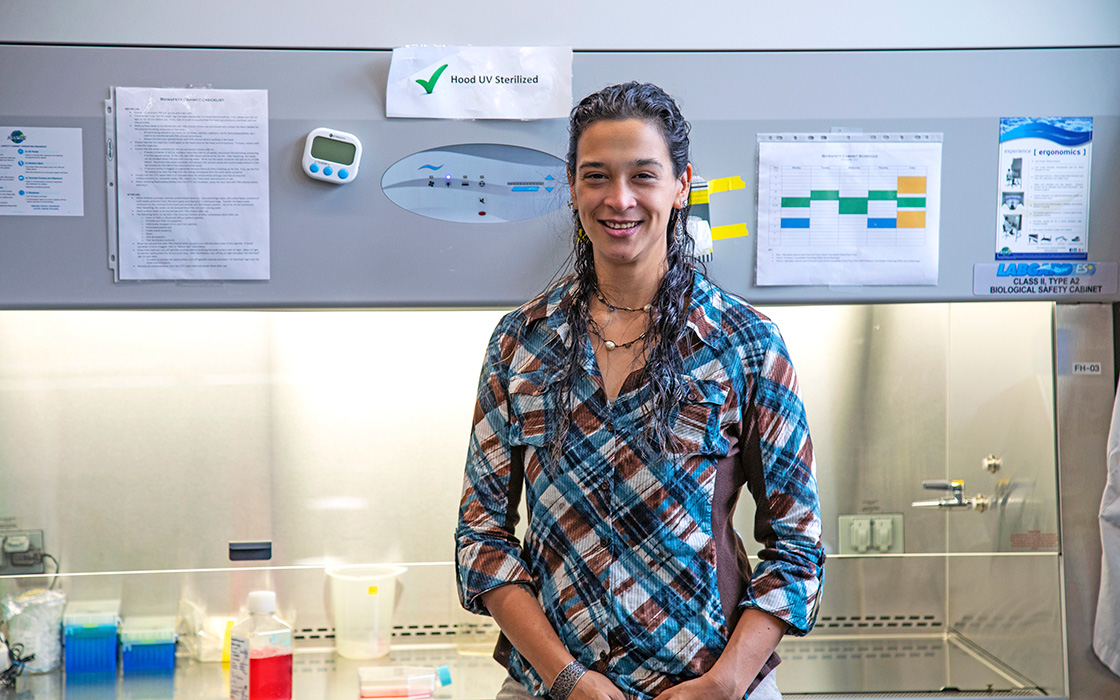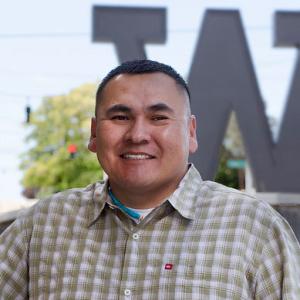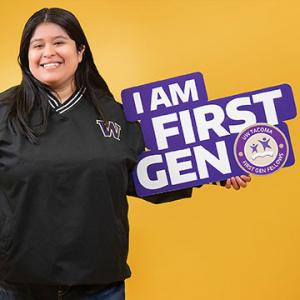
The Misfit Scientist
Assistant Professor Anna Groat Carmona's time as a self described "outsider" ultimately led her to a Fulbright to study infectious disease.
Anna Groat Carmona sits in her car, computer precariously balanced across her lap. Next to Groat Carmona, in the passenger seat, is a stack of graded papers. A tumbler of once-hot coffee idles in a cup holder. Groat Carmona yawns.
The morning is cold and dark, the sky a conveyor belt loaded with clouds as far as the eye can see. The Puget Sound churns underneath, rhythmic white noise that threatens to lull a beleaguered Groat Carmona to sleep.
The budding educator is on her way to work at Western Washington University (WWU) in Bellingham from her home in Port Orchard. “On a good day the trip would take three hours — one way,” said Groat Carmona. The jaunt includes a thirty-minute ferry ride from Kingston to Edmonds. “Ferry staff are wonderful people, but sometimes there are lines that took two hours to get through,” she said. “So, occasionally, I was in the car for five hours.”
Groat Carmona made this trek, sometimes up to five days a week, for three years. Why? “I had decided to leave industry and try academia, and, of course, I didn’t have much training in academics because that wasn’t my original goal,” she said. Groat Carmona applied for different teaching positions and was ultimately offered a job as a lecturer. “I thought this would give me an opportunity to get my stuff together and learn more about what goes into being an educator,” she said. “Still, we had two young kids and I didn’t want to uproot them, so I decided to commute.”
Something Different
Groat Carmona and her older brother are first-generation Latin Americans. “My parents both immigrated to this country,” she said. Groat Carmona’s father worked for PerkinElmer, a large international company that specializes in developing new technologies for use in medical and scientific fields. “We moved around a lot because of my father’s job,” said Groat Carmona. “We lived in Spain, Costa Rica, Brazil before settling down in Connecticut.”
This experience allowed Groat Carmona the chance to see the world and learn about different cultures but it also meant she had to start over every few years. “I was always in a new school,” she said. “I was always the ‘other’, I was always kept outside of the popular crowd because I was too nerdy or too geeky or was just the new girl who didn’t speak the language — I was a misfit.”
In high school the young Groat Carmona gravitated toward English and science classes. She knew she wanted to go to college, but she didn’t know much about higher education. “We didn’t really have a lot of college graduates in my family,” she said.
Fortunately, Groat Carmona’s older brother knew the ropes. During winter break of her senior year in high school, Groat Carmona traveled to Costa Rica to help her brother conduct fieldwork for his dissertation project. “He was in a Ph.D. program at the time and was researching mutualisms between Cecropia trees and Azteca ants,” said Groat Carmona. Mutualism describes a relationship between two organisms of different species where both organisms benefit.



The work wasn’t glamorous, but it was impactful. “I had every single mosquito bite,” said Groat Carmona. “It was hot and we were drinking gallons of water and trucking things to and from the field, plus we had to make every single piece of equipment from scratch.”
While in Costa Rica, Groat Carmona and her brother met a group of students from Dartmouth who were also doing research in the area. “They were really curious about this sibling duo and at one point they asked us if we’d be willing to give a short talk about the work we were doing,” said Groat Carmona. “My brother did the bulk of the presenting but I also got a chance to present and answer questions. I had never thought of myself as being in the position to know something before other people did and be asked to explain it to them. That was new, that was different.”
"Sign Me Up"
Groat Carmona graduated from high school and enrolled at Reed College, in Portland. “I believe I originally declared a double major in English and biology,” she said. Slowly, that double major became a major — in biology. Groat Carmona cemented her decision to pursue science during an internship at Oregon State University at the end of her sophomore year. “I was part of an infectious disease research group doing work on West Nile virus.” she said. “All the things I’m learning about in class didn’t apply to this virus because this virus has a way around, it had a way to make its own thing. So, finding out there were molecular misfits, I was like, ‘I’m home, I found what I want to do.’ ”
As Groat Carmona puts it, “Any chance I could get to do anything that had to do with infectious diseases, I was like, ‘Sign me up.’ ” Following graduation, Groat Carmona set her sights on graduate school. There was just one problem. “I didn’t know where to go,” she said. “I literally got on the computer and Googled infectious disease degrees.”
The search took Groat Carmona to the University of California, Berkley. “I decided to apply to this one program,” she said. “I sent one application, but I poured my heart and soul into that one application.” Program administrators contacted Groat Carmona a few months later and asked her to come visit campus. “During my interview they asked, ‘So, what happens if we say no?’ said Groat Carmona. “I responded with, ‘Well, if you say no, you might as well just keep my materials and I’ll send you an updated CV next year.’ ”
I moved out West to find my people, find my weirdos, my misfits, find the people who do things their own way and who are not necessarily following convention.
As it turns out, Groat Carmona didn’t need to send an updated CV. She received admissions to UC Berkeley’s Ph.D. program in infectious diseases and immunology. Groat Carmona completed her doctorate in 2011 then did post-doctoral work at the University of Washington for a year. Afterward she spent three years at the Center for Infectious Disease Research (CIDR) in Seattle.
Finding a Home
From the CIDR, Groat Carmona transitioned into higher education and three years of punishing commutes via car and ferry. The journey to get to where she is today was long and ultimately fruitful. Groat Carmona got a chance to run a small lab while at Western. She also got involved with a group on campus that taught researchers and educators how to do community-engaged service. “I was able to get all this awesome, cool, crazy experience that really helped me when I got here,” she said.
Groat Carmona came to UW Tacoma in 2018. She quickly put the skills she developed at Western to use on campus teaching courses in biology and biomedical sciences. “I spent a lot of time thinking about how I build a course that will get students to the point that, when they walk out the door, they’re ready for what’s next,” she said. “I’ve developed a ground-up approach where I build up layer by layer and show students how these layers are interconnected so that they can see how these things rely on one another.”





Outside of the classroom, Groat Carmona is busy researching. “I work on molecular mechanisms of infectious agents including how these diseases establish their replication cycle,” she said. “The goal of knowing this is that, at some point, we can use the information to develop new drugs or counter measures including vaccines.”
Groat Carmona specifically studies malaria and dengue fever. “One is a parasitic disease, the other is a viral disease, but both are spread by mosquitoes,” she said. Groat Carmona enlists students in this research. “I usually have somewhere between six to eight students assisting me in the lab,” she said. “Most of my students stick around for multiple quarters which is something that I really love because during the first quarter they’re just learning the ins and outs but by the second and third quarter they’re the experts in what they’re doing.”
It’s fun working with students in the lab. It’s great seeing them be able to use what they’re learning in class. Also, it’s great for them to see that science is not perfect. Things go wrong and figuring out what went wrong is just as important as when things go right.
Groat Carmona was recently named a Fulbright Scholar. “The Fulbright combines my teaching, research and service goals into one big giant project,” she said. For this project Groat Carmona partnered with faculty at the Universidad Centroamerica José Simeón Cañas in El Salvador and that country’s Ministry of Health. The university is looking to build a biology program and the health ministry needed assistance with its mosquito surveillance program. “I thought, what if I teach some workshops that would help build up the molecular bio infrastructure and, at the same time, I could work with the ministry to collect information by building on its existing mosquito surveillance program to find out what diseases are circulating.”
Groat Carmona wants to make this project a long-term collaboration between Universidad Centroamerica and UW Tacoma. She also helps to encourage women in El Salvador to keep going with their education. “I’m a woman of color with a Ph.D., so I’m excited to serve as a mentor for women down there with master’s degrees and encourage them to get a Ph.D. and be a professor.”
Groat Carmona is proud of her “misfit” status. Although the badge might not apply anymore. She’s very much found a home, both at UW Tacoma and within the larger scientific community.



